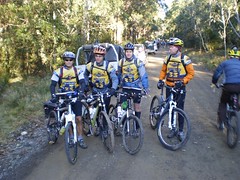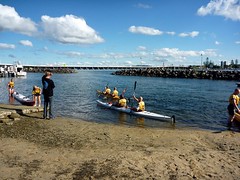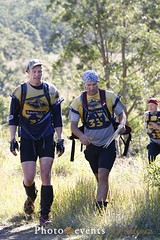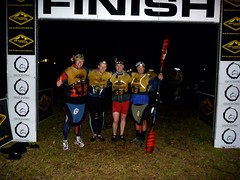Digging back through the archives, we’ve found an old race report from GeoQuest in 2009. We were racing as team “Echo” at the time. As you can see, our team names are pretty tragic, but more on that later. The full race report can be found below, and a selection of images from the race can be found in our photo gallery.
“Good morning” my team mate, Alistair, calls with a friendly half wave as we pass a local drinking a cup of tea on her front porch in Bulahdelah. I had to agree with him: it was a good morning. Sure, it was overcast, we hadn’t slept for over 26 hours since setting off for the GeoQuest start line the morning before and we’d just finished almost 8 hours on the bikes battling hills, faulty derailleurs, mud and the night, but the rise of the sun always seems to pick sleepy racers up again.
The lady on the porch seemed to think differently though. “Don’t you give me good morning you stupid f@#&ing b@#%&ds! Waking me up at f@#&ing 2am in the morning with your talking you bloody a@#%holes!” Craig, another team mate’s response of “Well, I guess a cup of tea is out of the question then?” seemed a much easier response than the full explanation that the noise wasn’t our fault, but that of the leading teams. This small tirade certainly served as a pick me up though, putting an extra bit of spring in the step of the team, however this was rapidly ablated by the first climb up into the surrounding hillside.
 The 2009 GeoQuest represented our second foray into this race after a successful outing at Emerald Beach in 2008. The team included one new member, Alistair, along with a new team name: Echo. This year we were hoping to improve on our overall placing in the rankings and possibly take out a win in the men’s category. A look at the line-up suggested one of the largest and strongest fields ever to front a GeoQuest with a lot of tough competition. As with any big race, the logistics started months earlier with a multitude of emails. Getting any team of four healthy racers together and to the start line of a race is half the work itself and I’m sure we all felt like we could have done with a bit more training in any one particular discipline.
The 2009 GeoQuest represented our second foray into this race after a successful outing at Emerald Beach in 2008. The team included one new member, Alistair, along with a new team name: Echo. This year we were hoping to improve on our overall placing in the rankings and possibly take out a win in the men’s category. A look at the line-up suggested one of the largest and strongest fields ever to front a GeoQuest with a lot of tough competition. As with any big race, the logistics started months earlier with a multitude of emails. Getting any team of four healthy racers together and to the start line of a race is half the work itself and I’m sure we all felt like we could have done with a bit more training in any one particular discipline.
 After a long drive from Brisbane down to Forster we arrived with bikes, kayaks, tubes, wood planks and support crew in tow. Friday morning was almost a relaxed affair, passing all requisite competency checks. The Geocentric crew had a surprise in store with a 5-legged race to rank start-times the next morning (suggesting that the opening leg would be on bikes, and not the traditional paddle). After a quick practice, we were one of the first teams to have a crack at this and it was with much amusement that we later heard ours was the second fastest time of the day. At map handout it was revealed that the much anticipated white water section was cancelled due to high water levels in the Barrington River, which was a disappointment. I can’t say I’ve ever actually had fun in a Sevylor kayak before, but I was hoping this would be our first chance. Maybe next time.
After a long drive from Brisbane down to Forster we arrived with bikes, kayaks, tubes, wood planks and support crew in tow. Friday morning was almost a relaxed affair, passing all requisite competency checks. The Geocentric crew had a surprise in store with a 5-legged race to rank start-times the next morning (suggesting that the opening leg would be on bikes, and not the traditional paddle). After a quick practice, we were one of the first teams to have a crack at this and it was with much amusement that we later heard ours was the second fastest time of the day. At map handout it was revealed that the much anticipated white water section was cancelled due to high water levels in the Barrington River, which was a disappointment. I can’t say I’ve ever actually had fun in a Sevylor kayak before, but I was hoping this would be our first chance. Maybe next time.
A quick look at the course revealed only two stages to this year’s race. The first stage would be a short bike-run-bike with a 3Hr car shuttle followed by a much longer stage looping out from Forster into the surrounding mountains and back up the coast via the large inland waterways. It was also apparent that there would be a lot of paddling this year, with most of the biking finished on the first day. Marking up the maps took all of the next five hours and it was close to midnight by the time we made it to bed.
An early rise at 5am saw a procession of teams and bikes make the long drive up to Barrington Tops for a high altitude, cold start. I have to admit being a little nervous starting second off the line. The first leg was a 40km bike ride with a lot of descent down the Barrington Range to the Bowman River. After our 20 seconds of fame, we were quickly passed by a couple of the gun teams, however APEX, winners of last year’s GeoQuest managed to break a chain just 5 minutes into the race. Amazingly, they had the chain fixed and caught up to us just as we reached the first checkpoint. After leaving this checkpoint we were witness to the lead teams riding back up the hill to where we just came from, obviously over shooting the CP, which was a nice little confidence boost for our navigation. We were then passed twice by team Mountain Designs on the way to the second checkpoint and then a third time as they rode back to CP2.  All too quickly the ride down to the Bowman was over and we had the first trekking loop of the day, requiring the collection of 3 CPs in any order. We settled on an anticlockwise loop which was made a lot easier by the earlier lantana bashing efforts of the Geo Half teams. The last leg of the first stage was a purported 23km ride over the Copeland Ranges. This ride had a few stinging hills in it, and it was on one of these hills that I started to feel the first effects of dehydration. Big efforts by my team mates with towing on the bike (in the first few hours of the race!) saw us make it in to the transition area. In a way we were lucky to have the white water section cancelled as it gave me a chance to come good again. It’s amazing the difference a bit of food and water can make and a great lesson in that no mater how bad things seem to be heading, you can always turn them around again. The first stage wasn’t quite done with us however. Organisers had allowed a generous 3 hours to drive back to HQ, dropping off gear along the way, before the start of the second stage. This 3 hours, however, blew out to longer when we suffered a flat tyre on our support vehicle. Fortunately, it was our only flat for the race.
All too quickly the ride down to the Bowman was over and we had the first trekking loop of the day, requiring the collection of 3 CPs in any order. We settled on an anticlockwise loop which was made a lot easier by the earlier lantana bashing efforts of the Geo Half teams. The last leg of the first stage was a purported 23km ride over the Copeland Ranges. This ride had a few stinging hills in it, and it was on one of these hills that I started to feel the first effects of dehydration. Big efforts by my team mates with towing on the bike (in the first few hours of the race!) saw us make it in to the transition area. In a way we were lucky to have the white water section cancelled as it gave me a chance to come good again. It’s amazing the difference a bit of food and water can make and a great lesson in that no mater how bad things seem to be heading, you can always turn them around again. The first stage wasn’t quite done with us however. Organisers had allowed a generous 3 hours to drive back to HQ, dropping off gear along the way, before the start of the second stage. This 3 hours, however, blew out to longer when we suffered a flat tyre on our support vehicle. Fortunately, it was our only flat for the race.
Stage 2 started with the first paddle of the race just on dark, with a lot of tricky navigation to pick the right passages and quickest routes around the islands. We were fortunate to have the tide with us on this and all subsequent paddle legs. The kayak was followed by the last and longest bike leg of the race. The next two legs required collecting 11 out of 14 checkpoints over a bike and trek leg. We decided to collect all but one of the bike leg checkpoints, and settled on a longer route that cut out some of the worst hills and included a section of bitumen for some of the worst climbing. I think we all struggled with lack of sleep at some point on this stage which, combined with some tough navigational decisions on old tracks, made for a slow time.
Never-the-less we made it on to the trekking portion of this leg by morning, past our lady friend on the porch, up into the hills and to the ropes section just in time for the rain to start. Unfortunately the rain made the rocks too wet to climb (as evidenced by the fact that neither our team mate or a climber from another team were able to make it up over the rock face despite only two other climbers from the lead teams also failing to do so). We were made to sit out our 15 minute time penalty in the cold and rain after which point I heard rumours that the ropes section would be closed down. We then collected the 3 remaining CPs on the ridgeline, spiking each dead on. Perhaps I let my navigational guard down, perhaps it was the lack of sleep or perhaps it was just too much social chatting (probably a combination of all three), but I managed to take the team on a 20 minute loop starting and ending at the same set of powerlines on the walk out to the transition area.
 The next leg was actually a really strong one for team Echo, requiring construction of a tube raft, followed by a 5km paddle across the lake with a portage halfway. Knowing that these legs can really sting a team, we had practiced building and paddling our raft on two separate occasions prior to the race (probably the only two times we got together as a whole team outside of the pub). Our design was essentially a long line of tubes with overlapping planks of wood strapping them together on each side. Alistair demonstrated some hidden talents with ropes and knots which alone justified his inclusion on the team. I assumed every team would have a similar variation of our long skinny raft, but this was far from the case. I saw rafts which were 4×2 tube arrangements, rafts stacked two tubes high and cross shaped rafts. These alternate designs culminated in a team starting just in front of us, who had a gondola-designed raft, complete with a tiller-man standing on the back of the raft. We were fortunate to make a lot of ground on this leg.
The next leg was actually a really strong one for team Echo, requiring construction of a tube raft, followed by a 5km paddle across the lake with a portage halfway. Knowing that these legs can really sting a team, we had practiced building and paddling our raft on two separate occasions prior to the race (probably the only two times we got together as a whole team outside of the pub). Our design was essentially a long line of tubes with overlapping planks of wood strapping them together on each side. Alistair demonstrated some hidden talents with ropes and knots which alone justified his inclusion on the team. I assumed every team would have a similar variation of our long skinny raft, but this was far from the case. I saw rafts which were 4×2 tube arrangements, rafts stacked two tubes high and cross shaped rafts. These alternate designs culminated in a team starting just in front of us, who had a gondola-designed raft, complete with a tiller-man standing on the back of the raft. We were fortunate to make a lot of ground on this leg.
The next kayak stands out as my favourite leg of the race. Over a 20km paddle across Myall Lake with a portage three quarters of the way through, we were lucky to have flat water, trailing tide, an awesome sunset and full-moon rise on this leg. Thanks to the inclusion of a trolley and a few tie-downs in one of the kayaks by Alan, we were able to portage both kayaks on the 2.5km portage at a slow jog, overtaking about 5 teams struggling with skis and Mirages on their backs. It was probably the only time during the race our shorter, dumpier kayaks were a blessing. Over taking so many teams put a new wind into the team, and we breezed through this leg so quickly that we caught our support crew, Scott and Bill, by surprise, interrupting them just as they were about to dig into some well earned burgers.
Struggling into wetsuits, we set off for what looked like, at a glance, an easy 20km coasteer north with some inland tracks thrown in. This leg was to start with an 800m tube swim, but when we got to the shore, we realised we could wade around the edge of the lake and not go any deeper than our waist. It was a longer distance, but would be at a quicker pace, less effort and a lot drier. It unfortunately meant that our wetsuits were redundant weight (along with our now deflated tubes and PFDs) for the rest of the leg, but probably the right decision in the end, even if it cost a little extra time just to stay dry. The next section of the trek caught a lot of teams out with the confusing absence of a marked trail around a golf course combined with the dark, cold and fatigue. When about 6 teams all caught up together and no one could find the track, we decided to just take a NW bearing and hopefully hit the trail further along. Twenty minutes later and we had just given up on ever finding the trail, deciding to just bush bash it north, when literally 10m later we stumbled across the track, giving us the chance to make some good time on the teams behind us.
From this last trek, it was just a battle against the sleepmonsters for a final quick paddle home. Another twist came at the TA when we realised that there was an extra CP that we hadn’t punched yet, but hadn’t marked on the map. We were lucky to find out that it was part way along the final paddle, and lucky to find it without a written description or grid reference, just the information that the punch was at the end of the point. During this paddle, I could hear Craig chuckling in the other kayak as Alan was talking in his sleep while paddling. According to Craig, he could feel the boat slow as Alan nodded off, followed by some mumbled gibberish. At one point however, Al could clearly be heard asking “What’s a tea filter for?” – we’re still not sure what a tea filter is for at this point.
We were just finally paddling in to the finish line when no sooner than someone had finished saying “Let’s just enjoy this moment boys” when Craig called out “S#@t, there’s another team!” Sure enough, appearing from a side channel and just ahead of us, another set of headlights was steaming to the finish. Judging from their pace, they had obviously seen us before we saw them. The race was then on in earnest. I don’t think I’ve ever paddled as hard as I did then, even after 43 hours of racing – it’s amazing the reserves the body can dig into when the mind thinks it’s exhausted. We knew that there was another men’s team in the mix for the lead and that they were on skis just like the team we had spotted. They hit the beach about 20m ahead of us, and we nearly wrote both kayaks off when we collided amongst ourselves in our rush to get through the break water. When we hit the land, it was skirts off and a crazy scramble of bodies up the path, through the gate and over the finish line. In the end, we got all four team members over the line first, but it was quickly realised that the other team were a mixed team. We were then greeted with the news that we were the first ranked men’s team home.
Despite being awake for almost 46 hours, it was still another 90 minutes before we made it to bed as we relived moments from the race between team members and support crew. A big thanks must go to Scott and Bill who did another stellar job this year, backing up from their efforts last year. I’ve done a number of 24 hour races with Scott, and I’m convinced racers make the best support crew: they know how you’re feeling and what you need done to get you back out on the course functioning properly. So, Geo ’09 was a successful outing – a win in the mens division and a 13th place overall after time penalties were taken into account. The course was brilliant with a great mix of trekking, biking and paddling on different terrains with the right balance of novelty disciplines. Just a shame it’s another years wait until the next race!



No comments yet.